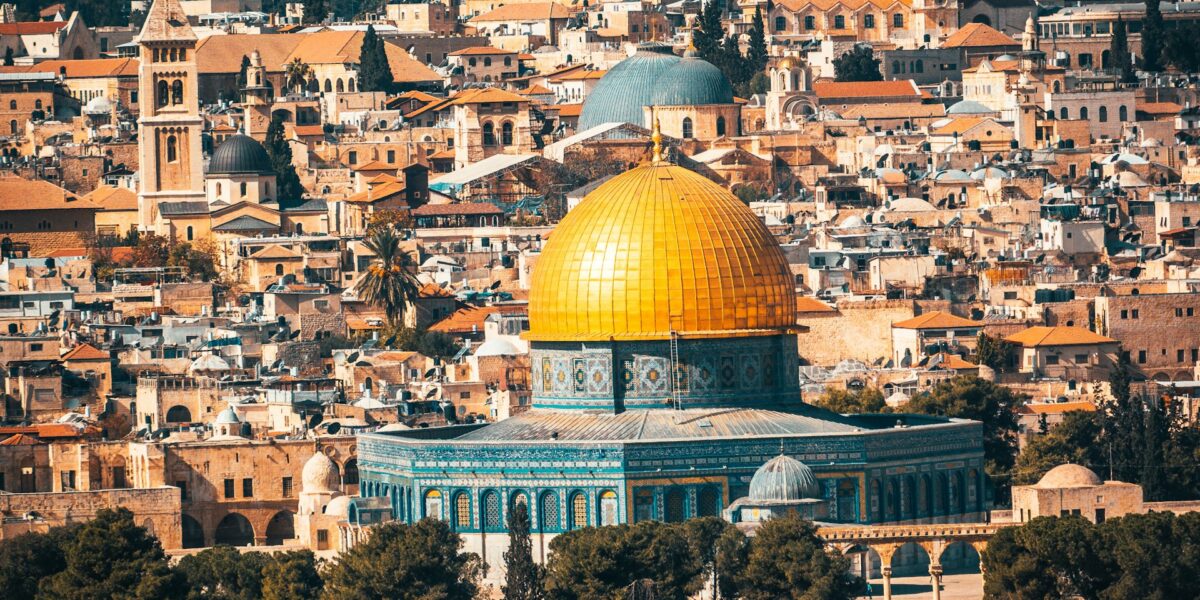I met Rami Nashashibi 10 years ago at a U.S. Islamic congress in D.C. while I was exploring religion and politics. He was a panelist, founder of a grassroots Chicago group, the Inner-City Muslim Action Network, in the diverse, legendary South Side. Such areas were once called ghettos, like zones to which Jews were confined in medieval Europe — Elvis’ song, In the Ghetto, references Chicago — though such amiable elisions of Jewish-Black experience are no longer common.
Watching him interact with people after, I was struck by his attentiveness and fluent Arabic, alongside a clearly native English. Turned out he was a Palestinian-American whose family migrated to the U.S. He moved easily in both worlds. I asked if his battles for social justice ever conflicted with his spiritual bent. He said he couldn’t have persisted in the former without the latter.
Chicago recently became the largest U.S. city to call for a Gaza ceasefire, which Rami wrote about in USA Today. (It’s also where a landlord knifed a six-year-old to death, ranting, “You Muslims must die.”) A week before Hamas’s October 7 attack, Rami was with an interfaith group in Jerusalem that visited the Holocaust memorial, Yad Vashem, and then his ancestral village, Ein Karem, just down the hill in a now Israeli suburb.
He said his grandad, who’s 97, told him that postwar, in 1945, their village took in about 250 Jewish refugees from Poland. They lived “harmoniously” till 1948, when Jews were evacuated and Palestinians were “expelled or fled,” during the fighting that created Israel. “They were beautiful people,” his grandad said. “We were very happy to have them with us and very sad to see them go,” adding that each helped the other.
Is this too frail a reed to hang hope for a harmonious future on? Absolutely. There were indeed refugee waves through British-run Palestine in those years, including Poles, but many were Catholic. Some stayed and built up a convent school in Rami’s village. Passed-down oral history of this sort is often murky and inconclusive. But then so’s the official kind.
In fact, records also show that Poland’s ambassador in Turkey helped save many Polish Jews in transit by listing them as Christian. Perhaps some were among the Jewish refugees Rami’s grandad recalls. He also shows a high level of flexibility and empathy toward others in distress, even if some may’ve wound up populating his town, to which he was never allowed to return. It suggests more is possible in this mire than endless recrimination.
Few places seem as burdened by historical agony as Israel-Palestine. Yet we may treat it too deferentially. We say things like, History will decide who’s right. But history’s written by historians who bring their own motives, like anyone. It’s like the law, which is supposedly objective but if that’s so, why do lawyers manoeuvre frantically over which judge gets to hear their case?
History can seem rigid and unchangeable but that’s often a result of trying to capture it for particular agendas. It may be better to periodically jettison, for instance, terms like Zionist and anti-Zionist, which arose when there was no state of Israel. Now it exists with citizens who’ve nowhere to “go back to,” just like Canada. That would at least help clarify the options, based on the realities.
Russian-American journalist and activist Masha Gessen, meanwhile, has breathed new meaningfulness into “ghetto,” comparing Gaza to the Warsaw ghetto where Nazis might besiege starving Jews who yet remained defiant. For this Gessen was partially cancelled in Germany in a situation so bubbling with irony, it’d be insane to even try to unravel.
History isn’t some unalterable place you can only take a guided tour of. It exists nowhere except the present, in our minds, in whatever ways it’s managed to embed itself, and can be jiggled around by whatever experiences may have recently pinged up against it. I’m not saying the ability to view a punitive past with some residual warmth, as Rami’s grandad did, provides hope. That would be facile and unwarranted. But at least it doesn’t embalm us in despair.
This column originally appeared in the Toronto Star.



